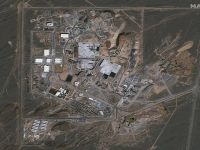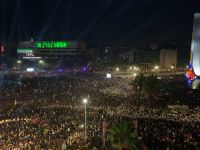On Monday September 22, 2014, a federal district court in Brooklyn, New York found Amman-based Arab Bank liable for providing material support to Hamas. The verdict came after just two days of jury deliberations following a thirty-day trial. This was the first time a terrorism finance case brought against a bank under the Antiterrorism Act of 1990 (ATA) made it this far.
While unsurprising, the verdict remains significant as part of a continuing trend in which bolstering biased political narratives has taken precedence over truth and justice in U.S. courts.
The Arab Bank Case
The Arab Bank case concerns twenty-four resistance operations that occurred in Israel during the waning years of the Second Intifada, around ten years ago. All 297 plaintiffs are dual Israeli-American citizens, who were either killed, injured, or lost a family member in these operations, for which Hamas (and no other Palestinian armed resistance organization) has been exclusively blamed.
Arab Bank, the largest single financial institution in the Middle East, stood accused of “knowingly supporting” Hamas by handling transfers and payments for Hamas members, including bank transactions for a Saudi charity called the Saudi Committee, which allegedly provided “martyr payments” to the surviving family members of those killed in resistance operations.
The U.S. Congress enacted the Antiterrorism Act of 1990 in response to the hijacking of a cruise ship, the Achille Lauro, and the bombing of Pan Am Flight 103 over Lockerbie, Scotland. The legislation was intended to allow victims of such incidents to seek compensation in U.S. courts, thereby circumventing the complexities of holding “international terrorists” accountable. Under the act, terrorism is defined according to applicable U.S. law, meaning those acts considered to be “terrorism” and those actors considered to be “terrorists” are determined, in advance, by the U.S. government.
After the ATA’s enactment, there was a surge in lawsuits, many of which were directed toward third parties. As American legal experts Lanier Saperstein and Geoffrey Sant noted in a piece about the ATA, these cases included claims made by a group of American soldiers who had been injured during the destruction of Iraq’s chemical weapons stockpiles after the first Iraq war and attempted to sue European-based banks that had provided credit to the Iraqi government.
That case, and others like it, was dismissed against plaintiffs before reaching trial. As Saperstein and Sant, asserted, the court held “that issuing letters of credit to manufacturers did not proximately cause the plaintiffs’ injuries, nor was it reasonably foreseeable that the letters of credit would be used specifically for manufacturing chemical weapons.”
In the instant case, plaintiffs accused Arab Bank of “turning a blind eye” to the funding of Hamas operations. Interestingly, the Saudi Committee’s charitable donations were highlighted, even though the organization had a wide breadth of charitable projects and had not been designated, at the time, as a financer of terrorism by either the United States or any other country. During the trial, plaintiffs’ lawyer, Tab Turner, played up stereotypes and hysteria surrounding terrorism to sway the jury. In his closing argument, Tuner called Arab Bank, “the bank of the stars in the world of terrorism.”
As The New York Times reported, jurors were so overtaken by this emotional manipulation that one member said, “The money and the financing is the oxygen for the terrorists.”
Arab Bank is appealing the verdict, arguing that the district court followed improper procedures in restricting the evidence it could introduce, allowed plaintiffs to suggest improper inferences to the jury, and conducted “nothing more than a show trial.”
If Arab Bank does not win on appeal, the jury’s decision will have enormous ramifications. It will allow plaintiffs to bring cases against third parties, such as financial institutions, on the basis of a highly vague crime, “providing material support,” for the even more abstractly defined and incredibly political, “act of terrorism.” As Saperstein and Sant note:
In the context of banks that provide routine commercial services to its customers, the analogy is even more strained. A more apt analogy would be to say that a bank that transfers money to an organization that ends up using it in an evil way is akin to passing along money to a person who unexpectedly buys a gun and shoots people. Or, to flip the analogy, forcing a bank to pay damages for terrorist acts simply because terrorists received fund transfers through the bank is akin to forcing a bank to pay damages for a shooting just because the killer bought the gun with money withdrawn from the bank.
As a matter of public policy, it is no doubt wise to be hawkish against the evils of terrorism. But expanding the scope of the ATA beyond its plain statutory terms creates a parade of horribles, making it difficult, if not impossible, to draw readily identifiable lines between proper and improper conduct and creating significant financial uncertainty, while spurring much private litigation. Plus, if Congress wishes to extend the ATA to non-terrorist third parties, especially for routine commercial transactions, it should be given the opportunity to amend the ATA in that way.
But Congress may not wish to do so, and for good reason. Allowing such a broad scope to the statute could negatively affect international relations and U.S. businesses. Congress had good reason to be cautious about the range of defendants ensnared by the ATA, including the fear that other nations would allow similar claims to be brought against U.S. entities for merely processing transactions.
Justice and Hypocrisy
While Arab Bank has been targeted using the flimsiest of arguments, corporations and financial institutions that have directly harmed American civilians have escaped liability for their crimes.
The case of Rachel Corrie brings this reality into stark relief. Corrie was a twenty-three-year old American activist and student who was run over and killed by a Caterpillar bulldozer in Palestine on March 16, 2003. She had been trying to stop the bulldozer, driven by Israeli military personnel, from demolishing a Palestinian home while the family was inside.
After her death, Corrie’s parents filled a lawsuit against the Illinois-based Caterpillar company, charging it with aiding and abetting war crimes and other serious human rights violations by providing bulldozers to the Israeli army knowing they would be used unlawfully to demolish homes and endanger lives in the Occupied Territories. Israel’s common and terrifying use of Caterpillar bulldozers to destroy thousands of homes in the Palestinian Territories has been well documented.
As plaintiffs argued, Caterpillar had violated state, federal, and international law and was complicit in Israel’s war crimes, extrajudicial killings, and cruel, inhuman, or degrading treatment or punishment of Palestinians. In bringing their case, Corrie’s parents relied on the Alien Tort Statute (ATS), the Torture Victim Protection Act (TVPA), and the Racketeer Influenced and Corruption Organizations (RICO) Act, as well as common law claims of wrongful death, public nuisance, and negligence. The case was filed in the District Court for the Western District of Washington on March 15, 2005.
In November of that year, the district court judge, Franklin Burgess, dismissed the case. Among the many reasons for his decision, the judge argued that Caterpillar’s “selling products to a foreign government does not make the seller a participant in that government’s alleged international law violations.”
The judge also invoked the political question doctrine, which directsthe courts not to decide “political question,” which are considered nonjusticiable.
While plaintiffs appealedthe decision, the Ninth Circuit appellate court affirmed dismissal on the basis of the political question doctrine, adding that the bulldozers were paid for by the U.S. government as part of its aid to Israel, and that the court could not rule on the merits of the case without ruling on whether the government’s financing of these bulldozers was appropriate.
The key difference between the Caterpillar and the Arab Bank cases should be clear. In the U.S. justice system, where the designation “terror” or “terrorism” is relevant, actors like Hamas – whose members are considered “terrorists” by the American political establishment – are automatically liable, while other entities, especially allied states, have more legal protections. As abstract a concept as terrorism is, it leads to very quick, legal recourse and punishment.
In the latest example of this trend, on November 4, 2014, Palestinian-American citizen Rasmieh Yousef Odeh went on trial in a U.S. district court in Detroit, Michigan for failing to disclose “her terror attack conviction in her immigration papers.”
Odeh, who is a well-known activist and associate director of the Arab American Action Network, faces ten years in prison and possible loss of her U.S. citizenship. Odeh’s alleged “terror attack conviction” came in 1969, when Israeli forces jailed her for involvement in a number of bombings. She was released during a prisoner exchange in 1980 and immigrated to the United States from Jordan in 1995. According to Odeh’s defense attorney, she confessed to the bombings under torture and rape.
As her lawyer rightly argued, “jurors could turn against Odeh if prosecutors and witnesses describe the acts of terrorism” she had allegedly committed.
The crime of terrorism bends and morphs justice in the United States. It is a tool, whose power is so dense that it politicizes justice and leads to the sort of legal absurdities we find in the Odeh case.
If one examines cases involving American citizens killed by Israeli forces,this trend becomes even clearer. There is no legal recourse, what so ever, for these victims. Undoubtedly realizing this absurdity, family members of the American-Turkish man, Furkan Dogan, who was executed by Israeli commandos during an attack in international waters against an aid flotilla heading to the besieged Gaza Strip, have yet to bring a case in U.S. courts. There have also have been no legal measures taken, so far, in the brutal August 2014 beating of a fifteen-year old Palestinian-American boy, Tariq Abu Khdeir, by Israeli police. In all likelihood, there are no legal avenues available to the family of Orwah Hammad, a fourteen-year-old Palestinian-American citizen, who was shot and killed by Israeli forces.
These cases inevitably fail because the illegal actions of the defendants, namely, Israeli officials, are a priori legitimized by the U.S. political and judicial system. These individuals have already won before any case has even been brought against them. Unable to convincingly invoke “terrorism” as a basis for their claims, plaintiffs seeking to hold these officials liable for their crimes stand little chance in the U.S. courts.
The Threat of Reciprocity, Among Other Tactics
In some ways, one can understand the nature of the U.S. justice system. It is, after all, a product of society, and, therefore, is affected by the narratives in place.
But, if U.S. courts are little more than venues for politics and biases, then there should be reciprocity in return. If the U.S. justice system chooses to operate this way, then the U.S. government cannot complain if courts in other countries affected by U.S. violence decide to pursue third-party institutions that facilitate those crimes.
U.S. financial and banking institutions and other organs, corporations, and organizations should be targeted for supporting violence perpetrated against innocent civilians by the United States, its agents, and allies. While practically and politically speaking this will be difficult – among other reasons, because of the inability for most foreign courts to project their power and enforce verdicts – it is something that policy makers and citizens of affected states should seriously consider.
Arguably, reciprocity is a messy strategy, and can devolve into mindless tit for tat revenge. But it is one possible response, out of a range of potential tactics, which should be explored to induce change in the U.S. justice system’s approach to terrorism cases.
Ultimately, American citizens must become aware of the dysfunctions within their judicial system, and realize that the separation between the judicial and political spheres is often weak or simply non-existent. There is much work to be done, and the initial outcome of the Arab Bank case reveals a grander dynamic at work behind the scenes, one tied to problematic perceptions about certain communities within American society.
By: Yazan al-Saadi
This article was first published on muftah.org.







